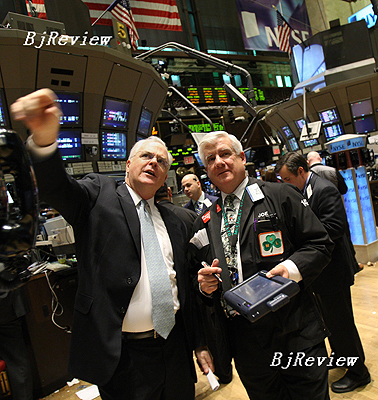|

On February 13, U.S. President George W. Bush signed legislation for an economic stimulus package worth about $168 billion to help salvage the dismal U.S. economy.
The whole process of approving the program was finished within one month, after the Bush administration originally put it forth on January 18. U.S. Congress passed the draft in early February and several days later the president issued the program.
Chinese economic experts said the plan would work well to stimulate U.S. domestic consumption and eventually usher in a general economic revival.
"The U.S. Government's high level of efficiency in this case reflects how serious the situation is now with the U.S. economy, which is worse than our prediction in December 2007," said Chen Fengying, Director of the World Economics Studies Center at the China Institutes of Contemporary International Relations (CICIR). Many experts previously said the slumping U.S. economy was not having any great impact on the country's growth.
Chen said economists and observers have not been entirely clear about the future of the U.S. economy. This is why the International Monetary Fund and the World Bank postponed their forecasts about the performance of the U.S. economy in 2008, she said.
The Bush administration believes the plan will quickly revive the ailing American economy. The government will spend about $168 billion, instead of Bush's original proposal of $145 billion, on stimulating individual spending, as well as investment by enterprises, to try to prevent the onset of a recession. In May, it will start issuing rebate checks of $600 for individuals and $1,200 for working couples in hopes that they will use the money to purchase goods and services. Those with children will receive an additional $300 per child under the plan. About 130 million Americans will be eligible to receive tax rebates. The program also encourages enterprises to buy new plants and equipment in return for tax relief incentives. The government will implement the program this year and in 2009.
Many American officials and economists expressed their confidence in the measure. House Speaker Nancy Pelosi said the package would create more jobs and generate economic growth. U.S. Treasury Secretary Henry M. Paulson specified that the program would create 500,000 to 600,000 jobs.
Some economists are now predicting that the country's annual economic growth rate could increase at least 0.7 percentage point more than the previous forecast. Stuart Hoffman, chief economist of PNC Financial Services Group, told the Associated Press (AP) that with the economic stimulus package the U.S. economy would grow 2.25 to 2.5 percent in the second half of 2008-1 percentage point higher than without it. "I do think this will give the economy a shot of adrenaline," Hoffman told the AP.
Just buy more
"If U.S. citizens use their tax refunds to purchase goods and services, the country's gross domestic product (GDP) growth would increase at least 1 percentage point in 2008," Zhen Bingxi, a senior research fellow at the China Institute of International Studies, told Beijing Review. He pointed out that the total annual consumption volume of the United States was about $9 trillion, which is the highest in the world and accounts for a large part of the country's GDP growth.
China's business journal Economic Observer published an article on February 14, arguing that the stimulus package would only work as planned if Americans used their rebates to buy goods and services. It cited an AP-Ipsos poll, in which only 19 percent of those surveyed said they would spend their rebates, while 45 percent said they would pay off debts and loans. Another 32 percent said they would invest the money, and the remainder indicated they would save the money because the future economic situation was still unclear.
Chen of the CICIR believes that the stimulus package will be sufficient.
"This act will work more like a government signal, which will help Americans to regain confidence in their economy, instead of practical economic profits," she said. "This is more significant to Americans."
Chen noted that even though the U.S. economy started sliding on a large scale in late 2007, it still continued to grow, though at a very slow rate. She also pointed out that the U.S. unemployment rate was 4.9 percent in January, slightly lower than 5 percent last December. And while American lawmakers are concerned with the expanding budget, Chen said that it had decreased last fiscal year. According to statistics issued in November 2007 by the U.S. Department of Treasury, the country's budget deficit for the 2007 fiscal year was $168.2 billion, a decrease of 34.4 percent over the amount during the same period in 2006. This was the lowest increase during the last five years.
The major effect of the sliding economy was not a decline in GDP
| 